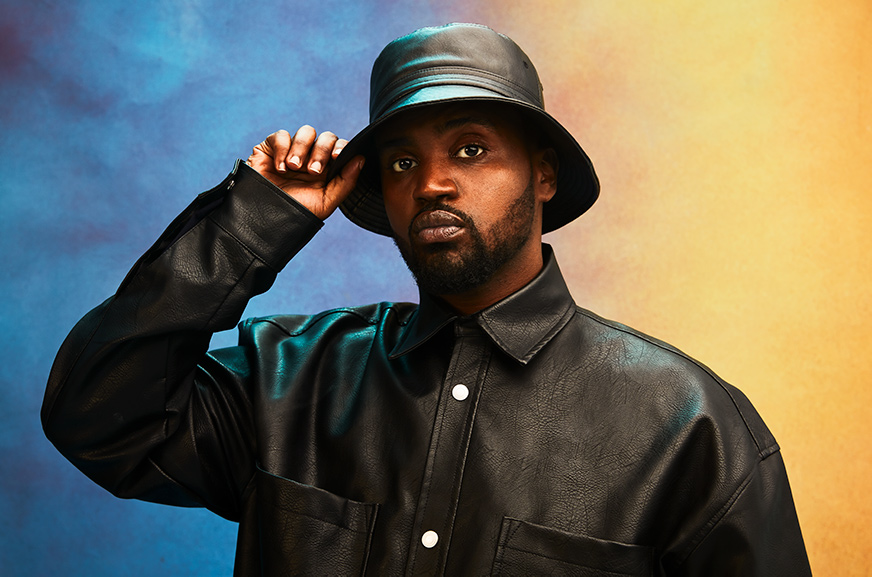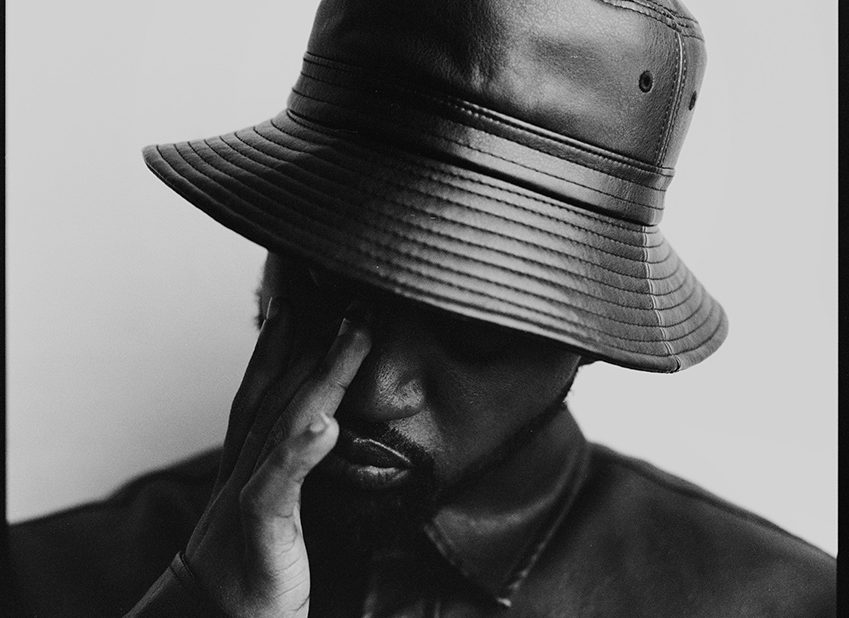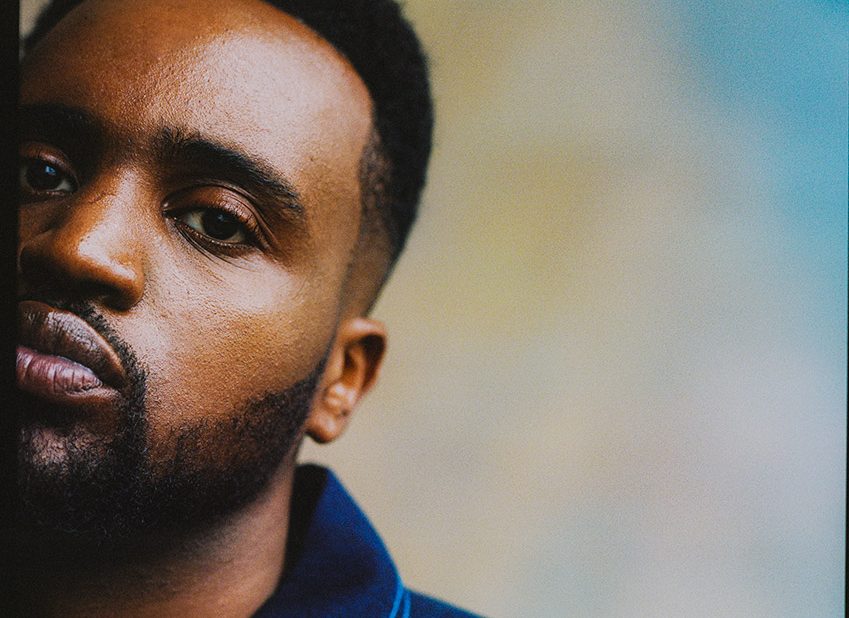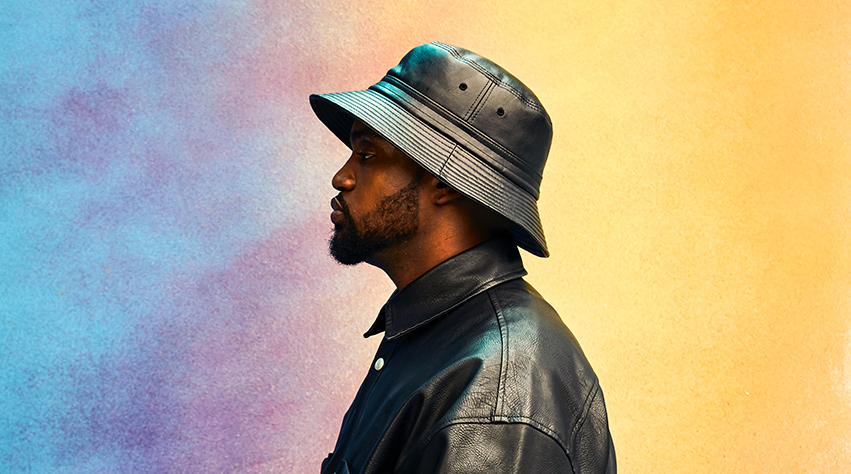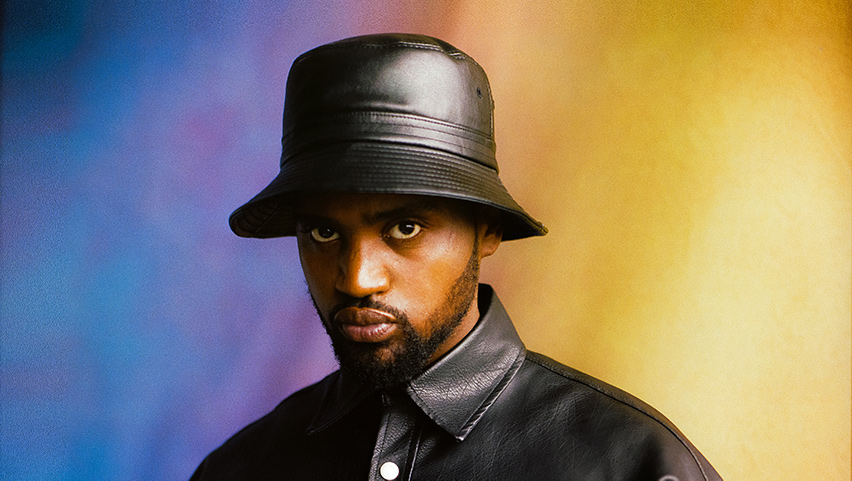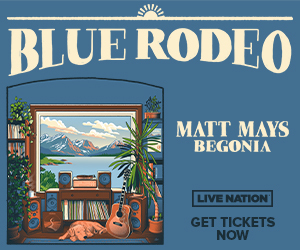Emanuel
Canada’s next R&B superstar serves up healing sounds for troubled times.
When Idris Elba—yes, that one—loves your music enough to ask his millions of social media followers to participate in a collaborative music video for your new song and signs on as executive producer of your debut album, you better be ready for a stratospheric rise.
“It was like being strapped to a rocket ship,” Emanuel, 27, says about Elba boosting his nascent R&B career.
The London, Ont. native’s tear-triggering tracks possess healing powers. When Elba tested positive for COVID at the beginning of the pandemic, he became quite self-reflective—Need You, Emanuel’s first-ever Spotify upload, was the raw and honest soundtrack to Elba’s musings.
He’s a really down-to-earth dude. He was telling me how special the music is, I was telling him how amazing his impact on my life has been. We were kind of just showing love to each other.
The music also moved Elba to take to social media and ask his nine million Facebook followers to send him images of what they needed to cope during lockdown. The resulting collage became Emanuel’s Need You music video.
“It’s crazy. Since I was young, I’ve seen him in movies, I’ve seen him in TV shows. He’s a giant, a huge inspiration,” says Emanuel.
They say to never meet your heroes. What happens when you actually do?
“I was at home, on lockdown in London. Our mutual friend said we’re going to get on a Face- Time with Idris Elba and discuss his proposal for a video. He’s a really down-to-earth dude. He was telling me how special the music is, I was telling him how amazing his impact on my life has been. We were kind of just showing love to each other,” says Emanuel, traces of excitement and disbelief still in his voice.
In the finished Need You video, Emanuel sits in a cold, empty living room, watching lo-fi fuzzy images on TV with longing: fathers hugging sons, musicians playing their instruments, lovers holding each another, a grandma smiling at the camera. The pure beauty of this therapeutic piano ballad hit not only one of film’s highest-grossing actors in the feels, but people from all walks of life around the world.
Including me. While doing research in preparation for this interview, I had a chill playlist on shuffle in the background. Out of nowhere the hairs on my arms began to rise as a string chorus swirled and rich vocals hit a note that filled the room. I perked up and paid attention. Who is that?
It was Emanuel, obviously.
I throw away convention, and just approach it through feeling. We go in there and freestyle.
Later that night, by then exclusively listening to his discography and impatiently awaiting the June 16 release of his debut full-length album Alt Therapy, the purity of the music moved me to tears. I wasn’t sad—his songs just tend to have that effect. And I’m not the only one: just read the YouTube comments on any of his music videos. They’re full of people so touched by the confessional tracks they just have to let him know.
“I just heard this on the radio, made me cry, so beautiful,” says one user. “I’m literally in tears, your voice, your energy … ” types another.
The alchemy in the wandering guitar tones, the supple strings and the strength of that vulnerable voice works like medicine injected straight to the heart. Emanuel’s balmy R&B compositions run with the likes of Daniel Caesar, but he can belt like John Legend. One sip of this magic brew and all bottled-up emotions will flow freely.
The honesty of the music is reflected in Emanuel’s warm demeanour. “I really appreciate you asking that question,” he says more than once during this interview, dressed in a black turtleneck and matching hoodie—a surprisingly cozy ensemble for a bright spring day in London. He makes sure I know this conversation means a lot to him.
Distilling something as intangible, complex and personal as emotions into stirring tracks that feel universally relatable isn’t easy. How does he do it?
“Being able to add simplicity to complexity is something that people search for. They search for understanding. And I think there’s a wisdom in being able to translate that into something as beautiful, as simple as music.”
If he were an ancient prophet, his title would be The Great Translator. He’s like the Alchemist from Paulo Coelho’s seminal novel—a wise man in touch with the Soul of the World. His pure tracks are the Elixir of Life, which according to legend, can cure all ills.
Need proof to back up this assertion? Emanuel, typically, doesn’t even prep lyrics. Choosing one of the melodies that co-composers and fellow Londoners John Fellner and Ryan Bakalarcyzk (who goes by “Bedroom”) have created, he rocks up to the mic and confesses whatever comes to him.
“Most of the time, it’s the music that really inspires me. Something about the chord progressions telling me a story. It makes me want to cry—I have to say something,” he says. “I throw away convention, and just approach it through feeling. We go in there and freestyle, we make music live off the floor. Approaching it like that allows me the opportunity to just be a channel in the moment.”
Though his first Alt Therapy songs were released at the beginning of the pandemic and offer exactly the type of comfort people need in isolating times, the bulk of the album was written in the Before Times.
In 2018, Universal set him up, along with his team, at a house in the quaint town of Kleinberg, Ont., just outside Toronto. For a year, they were free to create. After that came an 11-day trip to the Cayman Islands with nine collaborators, including Toronto hip hop legend and Universal Music Canada executive Kardinal Offishall.
Emanuel calls his time in the Cayman dreamscape “spiritual.”
“We worked on and added to some of my favourite music from the album. And I really got to have some great, deep conversations with people, and really get down to some questions.”
Questions like: what is his purpose in music? What is his purpose on this earth? These are the types of existential questions he’s referencing.
But don’t get it twisted: it wasn’t a 24/7 meditative retreat. Despite his soaring emotional intelligence and wise-beyond-his-years nature, he’s not holier than thou. He knows how to sin. There’s a mini-documentary about the Cayman sessions on his YouTube channel, in which he sits poolside with a wine glass as he speaks to the camera.
“We’re gonna eat good-ass food. We’re gonna drink. We’re gonna go look at the raw beauty of this place. Then we’re gonna come back, get fucked up and record,” he says, finishing the itinerary with a playful cackle.
His frisky side manifests in tracks like Medicine, a bouncing disco dance number that Starboy would definitely bop to, and Addiction, a hedonistic track with a swaggering beat in which he rhapsodizes about drug trips that fling him farther than the mile-high club.
But perhaps the most standout track recorded in the Cayman Islands is Black Woman. It’s a love note to Black women worldwide, acknowledging and empathizing with the unique struggles they face.
How do you smile when you’ve got nothing to smile about? How do you love when you’ve got no one coming back to the house? he croons, with vocals like honey pouring from the jar. The gravity, pain and hope in his delivery is reminiscent of the way Sam Cooke sings A Change Is Gonna Come.
When he played it for his mom, she cried. “She had a deep moment of silence. And then she looked up at me and she told me how appreciative and how proud she was that I would make a song like that.”
Black women from all over the world reached out to him about the aching song.
“It was really special. Being able to hear from my sisters in the United States and in England, letting me know that they felt seen, heard and appreciated. They felt like their story was told in an authentic way. That meant a lot, because that’s a really rare thing. It’s a sad truth—but it’s a really rare thing in this world.”
Emanuel considers himself just one piece in a larger movement that he calls a “Renaissance of beautiful Black art.” In this era of major civil unrest, which has shed light on racial injustices being committed in North America and all over the world, there has also been a wealth of artistic production by Black creators.
He draws inspiration from these artists. “It really adds richness to people’s lives,” he explains. “A lot of people in Atlanta, like Mereba, a lot of artists on Dreamville, J.I.D., J. Cole … young Black artists who are really unapologetic in their message. They live directed at truth. I feel like their whole message is sort of like The Great Awakening.”
Emanuel was awakened to the power of music by his Ethiopian family. “Music is the air they breathe,” he says of his father’s side. On his mother’s side, his grandfather was a priest in the Ethiopian Orthodox Church.
“He would be singing scripture,” Emanuel recalls. “The audible repetition is their form of meditation, really enriching themselves through the word.” Silently mulling over that memory in his head for a moment, he starts to subtly smile when he continues: “I think that definitely does play a large part in my subconscious inspiration, the way that I’m drawn to music how I am.”
Clearly satisfied with this realization, he confirms, “Yeah. I would imagine that that plays a huge part in it.”
Although his face lit up initially when talking about Ethiopia (he has visited three times), Emanuel’s expression begins to change into something more solemn. “There’s a silent genocide happening right now, that not many people are speaking on.” It’s a weighty subject, but he’s keen to talk about it. To shed light on it.
“It’s something that’s really hard to reconcile. Ethiopia has over 90 ethnic groups and over 80 dialects. The groups I belong to are Amhara, Tigray and Oromo. I’m not even sure how safe I would be if I went back to Ethiopia right now. And that being my homeland is really sad.
“There’s so many people that are losing their voice within all of this, all of these atrocities that are happening. It’s really sad.”
A common thread begins to emerge in what he’s saying: Emanuel is a born storyteller. Whether it’s his homeland in crisis, throbbing heartache or honouring Black women, he’s a conduit for those who are struggling. If the human race has a collective pulse, he can read it.
Consider that, before he was a professional musician, he was an in-patient cleaner at a London hospital. I’m half expecting him to say it was a means to affording recording studio fees, but I’m caught off guard when he says: “it was a really rewarding job for me. I was working with patients and I was cleaning. It was something I had real pride in.”
But Emanuel still felt a deep yearning to pursue music. In 2018, he followed his gut and began recording.
I think my role is to empower people. Allowing music to be a great medium for love, for retelling stories to really empower listeners in all walks of life.
Fitting that he’d click with Idris Elba. An actor and a musician? Both storytellers.
As a producer on Alt Therapy, the high-profile British actor isn’t just slapping his name on Emanuel’s record, shining some star power and walking away. He’s really there for Emanuel. Elba told him to call if he ever needed anything, any time of day—and actually meant it.
“He gave me his number. He sat with me and talked with me for a couple of hours. There was no shame involved. I’m not afraid to say that I was emotional, I was crying. Something was hurting me and I didn’t have clarity. He really did offer me wisdom that was helpful.”
And even though Elba’s very public endorsement of Emanuel went out to millions of his global followers, the singer doesn’t feel extra pressure.
“There is definitely a lot of pressure that I feel to perform well—I’m a human being. But no, I don’t really feel some sort of pressure to ride that wave, because I believe the music really does speak loudly. And I take Idris Elba’s interest as a testament to that.”
So, ditch Elon Musk and Mars—too cold, barren and devoid of human life. Board Emanuel’s rocket ship instead—it’s destined for the stars. Plus, Idris is already on board.

